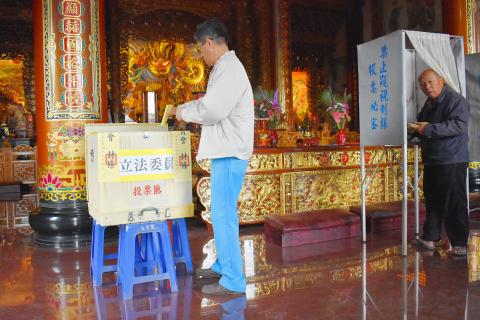The Democratic Progressive Party (DPP) yesterday retained two legislative seats, while the Chinese Nationalist Party (KMT) lost one of the two seats it previously held in legislative by-elections held in four cities and counties.
The DPP’s Yu Tian (余天) beat the KMT’s Cheng Shih-wei (鄭世維) and independent Su Ching-yen (蘇卿彥) in New Taipei City, and the DPP’s Kuo Kuo-wen (郭國文) defeated the KMT’s Hsieh Lung-chieh (謝龍介), as well as independent candidates Chen Hsiao-yu (陳筱諭), Wu Ping-hui (吳炳輝) and Hsu Kuo-tung (徐國棟), in Tainan.
In Changhua County, the KMT’s Ko Cheng-fang (柯呈枋) bested the DPP’s Huang Chen-yen (黃振彥), the New Power Party’s Yang Tse-min (楊澤民) and independent Chi Ching-tang (紀慶堂), while independent candidate Chen Yu-chen (陳玉珍) claimed victory in Kinmen County, defeating the KMT’s Hung Li-ping (洪麗萍) and independent candidates Chen Tsang-chiang (陳滄江), Tsai Hsi-hu (蔡西湖) and Lu Kuan-yu (盧冠宇), as well as the Kinmen Kaoliang Party’s Hung Chih-heng (洪志恆).

Photo: Yang Chin-cheng, Taipei Times
The by-elections were held to fill four seats vacated by lawmakers who won public posts in local elections in November last year or were stripped of their office by courts due to corruption.
Political observers had previously said that the by-elections would be a harbinger of next year’s presidential election.
The DPP and the KMT brought party heavyweights during campaigning, with President Tsai Ing-wen (蔡英文) and former premier William Lai (賴清德) lobbying for DPP candidates, and Kaohsiung Mayor Han Kuo-yu (韓國瑜) and former New Taipei City mayor Eric Chu (朱立倫) stumping for KMT candidates.
The KMT was hoping to ride the momentum it created in the local elections when it won a majority of the municipalities, while the DPP suffered a setback, the observers said.
The DPP, on the other hand, was hoping to make a comeback, they added.
At a post-election news conference at party headquarters in Taipei, DPP Secretary-General Luo Wen-jia (羅文嘉) said: “The DPP did not win — we just stopped the bleeding for now. While the outcome is encouraging, we are not calling for celebrations.”
The DPP would continue to build a coalition of individuals, organizations and parties with different ideals, but are united by a common cause, Luo said, before thanking Sunflower movement activist Lin Fei-fan (林飛帆) for stumping for Yu on Friday evening.
Asked whether the results suggested a weakening of the “Han wave,” a term that refers to Han’s reputation for energizing voters for other pan-blue political candidates, Luo said: “The only wave I care about is the democratic wave.”
KMT spokesman Ouyang Lung (歐陽龍) said that the KMT did not capture the three seats it targeted elsewhere, but held the line in Changhua County.
“Now is not the time for the KMT to be proud. We promise to the public that we will do everything in our power to nominate the best candidates for the presidency, vice presidency and lawmakers in the elections next year,” he said.
Additional reporting by Su Fun-her

Tropical Storm Gaemi strengthened into a typhoon at 2pm yesterday, and could make landfall in Yilan County tomorrow, the Central Weather Administration (CWA) said yesterday. The agency was scheduled to issue a sea warning at 11:30pm yesterday, and could issue a land warning later today. Gaemi was moving north-northwest at 4kph, carrying maximum sustained winds near its center of up to 118.8kph and gusts of 154.8kph. The circumference is forecast to reach eastern Taiwan tomorrow morning, with the center making landfall in Yilan County later that night before departing from the north coast, CWA weather forecaster Kuan Shin-ping (官欣平) said yesterday. Uncertainty remains and

SEA WARNING LIKELY: The storm, named Gaemi, could become a moderate typhoon on Wednesday or Thursday, with the Taipei City Government preparing for flooding A tropical depression east of the Philippines developed into a tropical storm named Gaemi at 2pm yesterday, and was moving toward eastern Taiwan, the Central Weather Administration (CWA) said. Gaemi could begin to affect Taiwan proper on Tuesday, lasting until Friday, and could develop into a moderate typhoon on Wednesday or Thursday, it said. A sea warning for Gaemi could be issued as early as Tuesday morning, it added. Gaemi, the third tropical storm in the Pacific Ocean this typhoon season, is projected to begin moving northwest today, and be closest to Taiwan on Wednesday or Thursday, the agency said. Today, there would likely

DISRUPTIONS: The high-speed rail is to operate as normal, while several airlines either canceled flights or announced early departures or late arrivals Schools and offices in 15 cities and counties are to be closed today due to Typhoon Gaemi, local governments announced last night. The 15 are: Taipei, New Taipei City, Taoyuan, Tainan, Keelung, Hsinchu and Kaohsiung, as well as Yilan, Hualien, Hsinchu, Miaoli, Chiayi, Pingtung, Penghu and Lienchiang counties. People should brace for torrential rainfall brought by the storm, with its center forecast to make landfall on the east coast between tonight and tomorrow morning, the Central Weather Administration (CWA) said. The agency issued a sea warning for the typhoon at 11:30pm on Monday, followed by a land warning at 11:30am yesterday. As of

CASUALTY: A 70-year-old woman was killed by a falling tree in Kaohsiung as the premier warned all government agencies to remain on high alert for the next 24 hours Schools and offices nationwide are to be closed for a second day today as Typhoon Gaemi crosses over the nation, bringing torrential rain and whipping winds. Gaemi was forecast to make landfall late last night. From Tuesday night, its outer band brought substantial rainfall and strong winds to the nation. As of 6:15pm last night, the typhoon’s center was 20km southeast of Hualien County, Central Weather Administration (CWA) data showed. It was moving at 19kph and had a radius of 250km. As of 3pm yesterday, one woman had died, while 58 people were injured, the Central Emergency Operation Center said. The 70-year-old